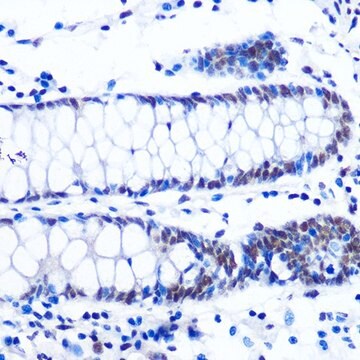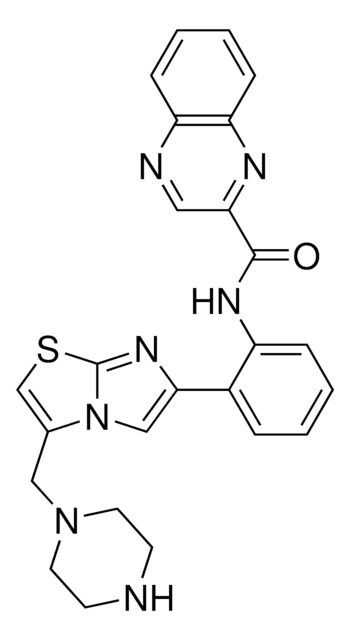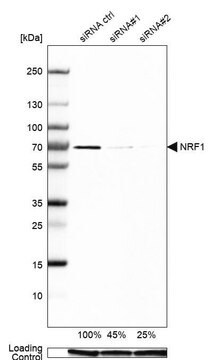ABE1844
Anti-NRF-1 Antibody
from rabbit
Synonym(s):
Nuclear respiratory factor 1, NRF-1, Alpha palindromic-binding protein, Alpha-pal, NRF-1
About This Item
Recommended Products
biological source
rabbit
Quality Level
antibody form
purified antibody
antibody product type
primary antibodies
clone
polyclonal
species reactivity
mouse, human, rat
species reactivity (predicted by homology)
porcine (based on 100% sequence homology), rhesus monkey (based on 100% sequence homology), horse (based on 100% sequence homology), bovine (based on 100% sequence homology), canine (based on 100% sequence homology)
technique(s)
ChIP: suitable
immunocytochemistry: suitable
western blot: suitable
NCBI accession no.
UniProt accession no.
shipped in
wet ice
target post-translational modification
unmodified
Gene Information
mouse ... Nrf1(18181)
General description
Immunogen
Application
Western Blotting Analysis: A representative lot detected NRF-1 in rat hepatoma cell line H4IIE treated with t-BH (Suliman, H.B., et al. (2003). J. Biol. Chem. 278(42):41510-41518).
Western Blotting Analysis: A representative lot detected NRF-1 in mouse hepatic nuclear proteins (Cherry, A.D., et al. (2014). J. Biol. Chem. 289(1):41-52).
Western Blotting Analysis: A representative lot detected NRF-1 in mouse liver after S. aureus inoculation (MacGarvey, N.C., et al. (2012). Am J Respir Crit Care Med. 185(8):851-861).
Western Blotting Analysis: A representative lot detected NRF-1 in rat hepatocytes and rat hepatoma cell line H4IIE cells (Carraway, M.S., et al. (2010). Circ Res. 106(11):1722-1730).
Chromatin Immunoprecipitation Analysis: A representative lot detected enhanced NRF-1 occupancy at the Sod2 promoter region in liver nuclear extracts from mice during S. aureus sepsis (Cherry, A.D., et al. (2014). J. Biol. Chem. 289(1):41-52).
Immunocytochemistry Analysis: A representative lot detected NRF-1 in Staphylococcus aureus peptidoglycan
(PGN) or dichloromethane (DCM)/carbon monoxide (CO) treated HepG2 cells (MacGarvey, N.C., et al. (2012). Am J Respir Crit Care Med. 185(8):851-861).
Immunocytochemistry Analysis: A representative lot detected NRF-1 in H9C2 rat cardiomyocytes (Carraway, M.S., et al. (2010). Circ Res. 106(11):1722-1730).
Epigenetics & Nuclear Function
Nuclear Receptors
Quality
Western Blotting Analysis: 2.0 µg/mL of this antibody detected NRF-1 in 10 µg of human liver tissue lysate.
Target description
Physical form
Storage and Stability
Other Notes
Disclaimer
Not finding the right product?
Try our Product Selector Tool.
Storage Class Code
10 - Combustible liquids
WGK
WGK 2
Flash Point(F)
Not applicable
Flash Point(C)
Not applicable
Certificates of Analysis (COA)
Search for Certificates of Analysis (COA) by entering the products Lot/Batch Number. Lot and Batch Numbers can be found on a product’s label following the words ‘Lot’ or ‘Batch’.
Already Own This Product?
Find documentation for the products that you have recently purchased in the Document Library.
Our team of scientists has experience in all areas of research including Life Science, Material Science, Chemical Synthesis, Chromatography, Analytical and many others.
Contact Technical Service








